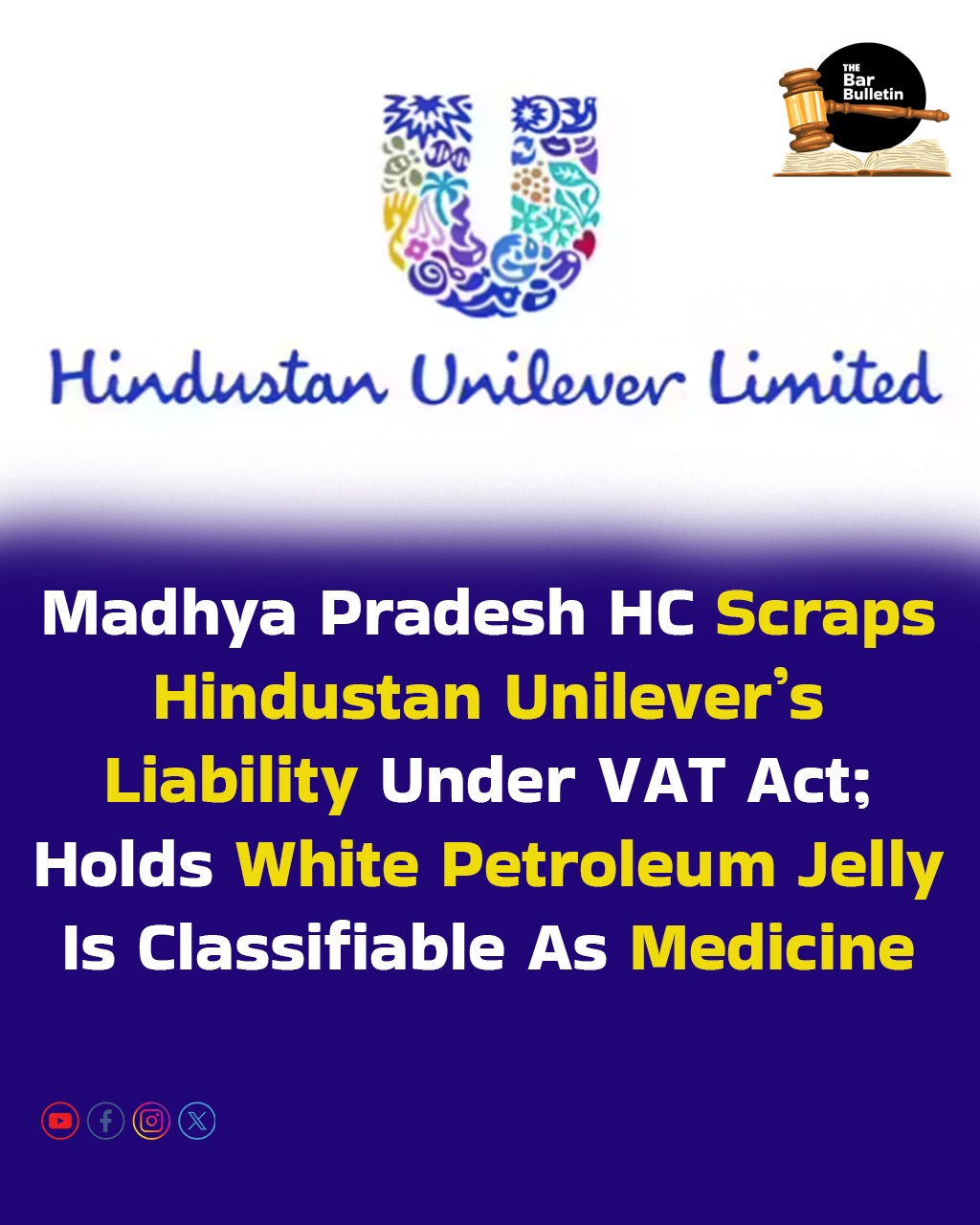While granting major relief to Hindustan Unilever, the Madhya Pradesh High Court (Indore Bench) recently clarified that in the VAT Act and Entry Tax Act, there was no specific entry for White Petroleum Jelly, however, Entry No. 19A, Part II, Schedule II of the MP VAT Act covered “Drugs and medicines, including vaccines, syringes, medicated ointments produced under drug license and light liquid paraffin of IP grade.” Since White Petroleum Jelly IP contains light liquid paraffin of IP grade and is manufactured under a valid drug license, the Court held that the white petroleum jelly manufactured by the FMCG shall be classified as a drug and medicine under Entry 19A of the MP VAT Act.
The Court therefore stated that the Madhya Pradesh Commercial Tax Appellate Board was not justified in upholding the classification of White Petroleum Jelly I.P. under Entry No. 41/49 of Part III of Schedule II instead of Entry 11 of Part IV Schedule II, considering the legislative amendments effective from March 15, 2000, in the classification of goods under the M.P. Commercial Tax Act, 1994.
The Division Bench comprising Justice Vivek Rusia and Justice Jai Kumar Pillai observed that White Petroleum Jelly has ingredients for caring and protection from specific skin problems, but it is not saleable as a beauty product. While it can be purchased from general stores without a prescription, the word “care” denotes that the product is used to prevent skin-related ailments in particular weather conditions, and it is not exclusively used for beautification.
The Bench extensively detailed the medicinal properties of White Petroleum Jelly, noting it is highly effective for healing minor cuts, scrapes, and scratches by creating a moist environment that prevents wounds from drying out and forming scabs. Studies show that a thin layer of petrolatum is as effective as a topical antibiotic ointment for non-infected wounds, serving as a protective barrier against external dirt and irritants.
Speaking for the Bench, Justice Rusia noted that the appellant-FMCG had manufactured and sold two distinct types of White Petroleum Jelly: a non-perfumed variant with light liquid paraffin manufactured under a drug license and sold as a drug, and a perfumed variant sold as a cosmetic on which tax was being paid at the higher rate. The appellant had categorized these different types and paid taxes accordingly under the respective categories.
Emphasizing the guiding principles for classification, the Bench pointed out that when a product contains pharmaceutical ingredients with therapeutic properties, the proportion is not invariably decisive; what matters is the curative attributes, and prior classification by drug authorities, and the primary function test distinguishes between “care” and “cure”. Accordingly, the Bench concluded that the appellant is not liable to pay interest under Section 18(1)(a) of the MP VAT Act.
Briefly, the petitioner company, engaged in manufacturing & marketing fast-moving consumer goods (FMCG), challenged the classification of “White Petroleum Jelly I.P” for taxation purposes under the Madhya Pradesh VAT Act, 2002. The company maintaining a branch depot at Indore, consistently claimed that White Petroleum Jelly I.P., being a medicated formulation manufactured under a valid drug license, fell within Entry No. 19A, Part II, Schedule II of the MP VAT Act dealing with “Drugs and medicines including vaccines, syringes, medicated ointments produced under drug license and light liquid paraffin of IP grade.”
The company manufactured two distinct variants: a non-perfumed variant with light liquid paraffin of IP grade sold as a drug, and a perfumed variant sold as a cosmetic with tax paid at higher rates. However, the assessing authority and appellate board classified the product as a cosmetic, subjecting it to higher tax rates of 12% under the residuary entry instead of the claimed 4-5% rate for drugs and medicines.
Cases Relied On:
Commissioner of Central Excise vs. Hindustan Lever Ltd. – (2015) 34 GSTR 497 (SC)
Appearances:
Senior Advocate P.M. Choudhary and Advocate Prasanna R. Bhatnagar, for the Petitioner/ Taxpayer
Advocate Bhuwan Gautam, for the Respondent/ Revenue



